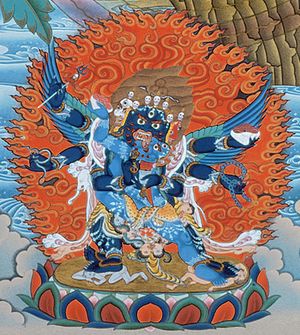Yangdak Heruka: Difference between revisions
Jump to navigation
Jump to search
mNo edit summary |
Stefan Mang (talk | contribs) No edit summary |
||
| Line 1: | Line 1: | ||
[[Image:TNYangdak.jpg|thumb|Yangdak Heruka from the thangka of [[Tendrel Nyesel]]]] | [[Image:TNYangdak.jpg|thumb|Yangdak Heruka from the thangka of [[Tendrel Nyesel]]]] | ||
'''Yangdak Heruka''' ([[Wyl.]] ''yang dag heruka'') or ''' | '''Yangdak Heruka''' ([[Wyl.]] ''yang dag heruka''), '''Vishuddha Heruka''' or '''Shri Heruka''' (Skt. ''Viśuddhaheruka'', or ''Śrī Heruka'') is one of the eight deities of [[Kagyé]], where he corresponds to Enlightened Mind. The wrathful manifestation of Vajrasattva, he is similar to the deity known as [[Chakrasamvara]] (Tib. ''Demchok''), practised in the [[Sarma]] tradition. It is said that all the deities of the [[Mother Tantras]] are included in the practice of Yangdak. | ||
The instructions related to Yangdak are based on the so-called "eight syllables of the ''rulu'' mantra".<ref>See Kongtrul (2005), pp. 322-323</ref> | The instructions related to Yangdak are based on the so-called "eight syllables of the ''rulu'' mantra".<ref>See Kongtrul (2005), pp. 322-323</ref> | ||
Revision as of 09:36, 17 September 2016

Yangdak Heruka (Wyl. yang dag heruka), Vishuddha Heruka or Shri Heruka (Skt. Viśuddhaheruka, or Śrī Heruka) is one of the eight deities of Kagyé, where he corresponds to Enlightened Mind. The wrathful manifestation of Vajrasattva, he is similar to the deity known as Chakrasamvara (Tib. Demchok), practised in the Sarma tradition. It is said that all the deities of the Mother Tantras are included in the practice of Yangdak.
The instructions related to Yangdak are based on the so-called "eight syllables of the rulu mantra".[1]
In the Longchen Nyingtik, the Yangdak practice related to Palchen Düpa is called "Union Of The Buddhas" (yang dag sangs rgyas mnyam sbyor).
Notes
- ↑ See Kongtrul (2005), pp. 322-323
Further Reading
- Jamgön Kongtrul Lodrö Tayé, The Treasury of Knowledge: Systems of Buddhist Tantra, Ithaca: Snow Lion, 2005